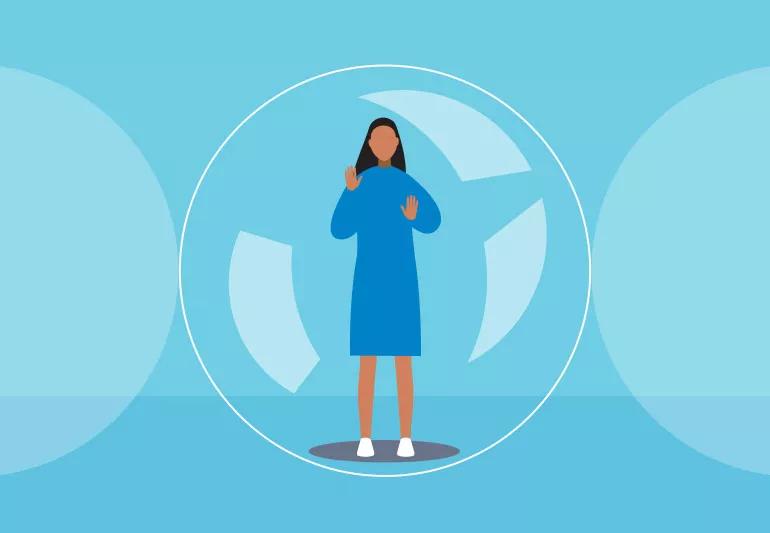Advertisement
Don't let your good safety habits slip

As the weather turns colder and coronavirus (COVID-19) cases surge once more with no end in sight, it’s understandable if, even with the best intentions, your personal social distancing and safety practices have started slipping a little bit.
Advertisement
Cleveland Clinic is a non-profit academic medical center. Advertising on our site helps support our mission. We do not endorse non-Cleveland Clinic products or services. Policy
Maybe you’ve found yourself standing next to family and friends at distances closer than six feet. Perhaps you’ve gotten a bit more relaxed about properly wearing your mask or even washing and sanitizing your hands regularly. After all, it’s been this long and you’ve stayed healthy so far, right?
It’s totally understandable that these skills have slacked off a bit; it feels like it’s been forever since all of this started and we all just want it to be over. The days all blur together, time has no meaning and it’d be great if we could just hug our friends again. It’s a long-haul fight and, just like someone running a marathon with no training, it’s easy to lose steam well before the finish line.
Unfortunately, though, even if your vigilance flags a bit, the coronavirus does not. This new wave of cases is the worst yet and the best offense against the virus is a good hygiene defense.
We spoke with psychologist Susan Albers, PsyD, about why we let down our guard and what we can do to stay on our toes as the pandemic continues.
The first thing you should know is that gradually relaxing your social distance practices is a very human thing to do, especially over a long period of time, so don’t be hard on yourself if you slip up.
“At first, we experienced this heightened sense of stress,” Dr. Albers says. “And when we feel stress, our bodies get pumped full of cortisol and we become hyper-alert. We can feel it in our bodies that we’re in that fight or flight state.”
Over time, though, as we adjust to that constant threat, she says, we get used to things and that’s when that stress level dips. “We either become habituated to that level of stress or the stress level goes down a little bit and even if we’re there’s danger out in the world, we’re not facing an immediate danger,” she says.
And that’s what allows us to let our guard down naturally over time, even if in doing so we’re barely aware of it. It may also explain why so much of the country didn’t seem to react to the summer wave of cases like they did that first initial wave in March and April.
“Some of it is just fatigue because when your body is in such a heightened state of stress in that fight or flight mode for so long, it gets exhausted.” Dr. Albers says. “So some of it is biochemical in nature, that we’re just in the fatigue state because we were at that heightened state of alarm.”
It’s also a result of how people have adapted to our current situation and found a new normal, whatever that might be, in their day-to-day activity. Over the course of the last eight-to-nine months, as we got used to the virus and tried to deal with other stressful situations that came as a result of the pandemic, our initial worries receded a bit. They aren’t at the forefront of our minds anymore and they get pushed back by other day-to-day concerns.
Advertisement
“Part of it is also decreased sensitivity to the source of threats,” she notes. “If things don’t happen immediately, sometimes we become very desensitized to it. Reframing your brain to accept that there is still danger out there, even if it doesn’t feel like it, is important.”
It’s important to focus on facts and feelings because, she says, “the feeling is that things are fine while the facts say something different.”
One of the best ways to fight this fatigue, according to Dr. Albers, is to take all of the steps you’ve done in the past to maintain your safety and make them routine. “When you have routines, you don’t think about them very much,” she says. “It’s kind of like brushing your teeth in that you don’t have to remind yourself to do it every day, you just do it.”
For instance, since washing your hands is such a big part of proper hygiene in coronavirus prevention, go straight to the sink to wash your hands every time you come home.
Forgetting a mask when you leave the house? Try keeping clean masks in your car for you to use whenever you leave. “These things that can keep you safe are really easy so we don’t get as fatigued by it.”
When it comes to social distancing, it can be hard but a good rule of thumb is to remind yourself that it’s just as much about the people around you as it is about you. Whether you’re wearing a mask, keeping at least six feet apart from each other or choosing to stay home rather than attend a crowded gathering, it’s about something bigger than just protecting yourself.
“You’re not just protecting yourself, but you’re protecting your friends and loved ones too,” says Dr. Albers. “Because spread among people who don’t have any symptoms of COVID-19 is such a big part of this, your social distancing effectively decreases the chance that you’ll potentially expose someone else to the virus if you happen to carry it.”
And it’s important to make sure your caution fatigue doesn’t develop into depression. “This chronic stress can turn into depression,” she says. “So if you feel like you’re just so down about it or in a very negative space, it’s helpful to consult a professional because chronic stress can turn into depression.”
This final point is essential since cases are skyrocketing just as we head into winter, a time when seasonal depression can compound other mental health issues, especially depression brought on by the pandemic.
Of course, besides recognizing your own slip-ups, there are constructive ways to help encourage friends and family that may be experiencing the same caution fatigue. “It’s good to be able to gently point out that people are not following some of the safety measures that they’ve done in the past and reminding them of the why,” Dr. Albers says.
Advertisement
It’s best on a personal level, a reminder that you care for them as much as you care for yourself. Using personal stories, maybe about someone you know, can bring the discussion to a personal level and better communicate your concern to them
And using confirmed data from a reputable source like the CDC can be a useful tool. “Sometimes, people are more swayed by facts than feelings,” Dr. Albers notes. “Looking at those charts, seeing where the numbers are, that can really remind people of the seriousness of the situation.”
Given that the new surge is coinciding with the holiday season, it’s important to reconsider your plans and remind your loved ones they probably should do the same.
It’s good to remember, she says, that we’re all in this together. “It helps for the long haul to know what you’re feeling is normal — this caution fatigue is a normal feeling — and you’re not the only person feeling it.”
Advertisement
Learn more about our editorial process.
Advertisement

A more open conversation on athletes and their mental health needs is overdue

Combat stress and anxiety — common chronic hives triggers — by focusing on sleep, staying active and leaning on others for support

Fostering romantic and/or sexual feelings for other people outside of your relationship can lead to long-term consequences

Taking care of yourself extends beyond symptom management and includes things like passion projects and meaningful moments

Connecting with loved ones, keeping a gratitude journal and reframing the situation may help the dread dissipate

Support groups, financial assistance and survivorship programs are all readily available

Our collective misremembering of events comes from a surplus of false memories

What’s on your plate can either help power you through your day or put you in nap mode

Focus on your body’s metabolic set point by eating healthy foods, making exercise a part of your routine and reducing stress

PFAS chemicals may make life easier — but they aren’t always so easy on the human body

While there’s little risk in trying this hair care treatment, there isn’t much science to back up the claims